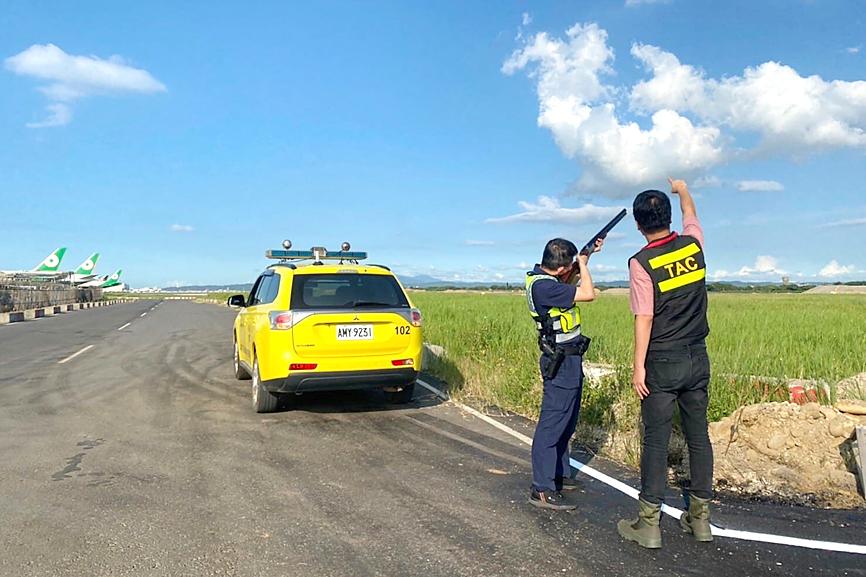Big data is helping Taiwan Taoyuan International Airport lower the risk of bird strike, adding to patrols and barriers set up to protect airplanes from dangerous collisions with animals.
Birds and other flying creatures pose a significant danger to aircraft, particularly during takeoff and landing, as they are more likely to encounter animals at lower altitudes.
Damage caused by bird strikes varies depending on the size of the aircraft and location of impact, but can lead to fatal consequences.

Photo courtesy of Taiwan Taoyuan International Airport Co
The airport has over the past few years adopted a number of strategies to secure its airspace to great effect.
Taiwan Taoyuan International Airport Co on Tuesday said that air traffic has decreased significantly due to the COVID-19 pandemic, with the airport seeing nearly 300 arrivals and departures per day.
The number of bird strikes has dropped accordingly, extending its downward trend from 39 strikes in 2018 and 23 in 2019 to only five last year, company data showed.
The firm had received an award for excellence in preventing bird strikes, as it had recorded a lower strike rate than targeted from 2017 to last year.
However, the trend seems to be reversing.
Although the number of flights over the first nine months was down 16 percent from the same period last year, the number of bird strikes was up slightly from the average, the company said.
This is due mainly to the area around the airport being a breeding and roosting ground for birds, it said, adding that the breeding season of many local species fell within the first half of the year.
To better understand their habits, the airport operator said it has been working with the Wild Bird Society of Taoyuan to set up a database with observations and other records.
Based on the data, the company would create monthly bird activity forecasts to inform professionals at the airport about which species might fly a certain altitudes at certain times, it said.
The company said that it is also seeking to make the airport grounds less attractive to birds by removing areas where they might roost as well as find water and food.
In August the firm started an initiative that surveys insect populations to better understand the birds’ food sources and general ecology of the area, it added.
Siren, buzzer and gun sounds are also employed to drive birds away during times of peak activity from 6am to 8am and 4pm to 6pm every day, the company said.
If a flock suddenly descends on a runway, it might be temporarily closed until they can be driven off, it added.

US climber Alex Honnold is to attempt to scale Taipei 101 without a rope and harness in a live Netflix special on Jan. 24, the streaming platform announced on Wednesday. Accounting for the time difference, the two-hour broadcast of Honnold’s climb, called Skyscraper Live, is to air on Jan. 23 in the US, Netflix said in a statement. Honnold, 40, was the first person ever to free solo climb the 900m El Capitan rock formation in Yosemite National Park — a feat that was recorded and later made into the 2018 documentary film Free Solo. Netflix previewed Skyscraper Live in October, after videos

NUMBERS IMBALANCE: More than 4 million Taiwanese have visited China this year, while only about half a million Chinese have visited here Beijing has yet to respond to Taiwan’s requests for negotiation over matters related to the recovery of cross-strait tourism, the Tourism Administration said yesterday. Taiwan’s tourism authority issued the statement after Chinese-language daily the China Times reported yesterday that the government’s policy of banning group tours to China does not stop Taiwanese from visiting the country. As of October, more than 4.2 million had traveled to China this year, exceeding last year. Beijing estimated the number of Taiwanese tourists in China could reach 4.5 million this year. By contrast, only 500,000 Chinese tourists are expected in Taiwan, the report said. The report

Temperatures are forecast to drop steadily as a continental cold air mass moves across Taiwan, with some areas also likely to see heavy rainfall, the Central Weather Administration (CWA) said. From today through early tomorrow, a cold air mass would keep temperatures low across central and northern Taiwan, and the eastern half of Taiwan proper, with isolated brief showers forecast along Keelung’s north coast, Taipei and New Taipei City’s mountainous areas and eastern Taiwan, it said. Lows of 11°C to 15°C are forecast in central and northern Taiwan, Yilan County, and the outlying Kinmen and Lienchiang (Matsu) counties, and 14°C to 17°C

STEERING FAILURE: The first boat of its class is experiencing teething issues as it readies for acceptance by the navy, according to a recent story about rudder failure The Hai Kun (海鯤), the nation’s first locally built submarine, allegedly suffered a total failure of stern hydraulic systems during the second round of sea acceptance trials on June 26, and sailors were forced to manually operate the X-rudder to turn the submarine and return to port, news Web site Mirror Daily reported yesterday. The report said that tugboats following the Hai Kun assisted the submarine in avoiding collisions with other ships due to the X-rudder malfunctioning. At the time of the report, the submarine had completed its trials and was scheduled to begin diving and surfacing tests in shallow areas. The X-rudder,